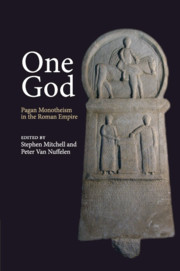Book contents
- Frontmatter
- Contents
- Preface and acknowledgements
- List of abbreviations
- 1 Introduction: the debate about pagan monotheism
- 2 Pagan monotheism as a religious phenomenon
- 3 Pagan ritual and monotheism
- 4 The case for pagan monotheism in Greek and Graeco-Roman antiquity
- 5 Monotheism between cult and politics: the themes of the ancient debate between pagan and Christian monotheism
- 6 The price of monotheism: some new observations on a current debate about late antiquity
- 7 Megatheism: the search for the almighty god and the competition of cults
- 8 Deus deum … summorum maximus (Apuleius): ritual expressions of distinction in the divine world in the imperial period
- 9 Further thoughts on the cult of Theos Hypsistos
- Bibliography
- General index
- Index of authors, works and citations
1 - Introduction: the debate about pagan monotheism
Published online by Cambridge University Press: 20 May 2010
- Frontmatter
- Contents
- Preface and acknowledgements
- List of abbreviations
- 1 Introduction: the debate about pagan monotheism
- 2 Pagan monotheism as a religious phenomenon
- 3 Pagan ritual and monotheism
- 4 The case for pagan monotheism in Greek and Graeco-Roman antiquity
- 5 Monotheism between cult and politics: the themes of the ancient debate between pagan and Christian monotheism
- 6 The price of monotheism: some new observations on a current debate about late antiquity
- 7 Megatheism: the search for the almighty god and the competition of cults
- 8 Deus deum … summorum maximus (Apuleius): ritual expressions of distinction in the divine world in the imperial period
- 9 Further thoughts on the cult of Theos Hypsistos
- Bibliography
- General index
- Index of authors, works and citations
Summary
Within the largely stable social and political structures of the Roman Empire, the most far-reaching change was the religious revolution by which the polytheistic environment of the age of Augustus gave way to the overwhelming predominance of monotheism in the age of St Augustine. The study of monotheism is not easy for students of classical antiquity. This transformation in religious ideas and behaviour had profound consequences for individuals, for social organisation, for the exercise of political authority, and, above all, for the way in which men and women understood their place in the world. The prevalence of monotheism now marks one of the largest differences between the modern world and classical antiquity. Precisely for this reason the differences between Graeco-Roman polytheism and the Jewish, Christian or Islamic monotheisms, which have dominated our own religious and cultural experience since the end of antiquity, pose a serious challenge to our understanding of the past. We view ancient religion through a filter of assumptions, experiences and prejudice. Monotheism contains its own internalised value judgements about polytheistic paganism, and these have always influenced, and sometimes distorted, the academic study of ancient religion.
Monotheism today seems not only to have triumphed historically but also to be morally superior to polytheism. This is one of the reasons why the study of paganism is often segregated from historical work on early Christianity or Judaism.
- Type
- Chapter
- Information
- One GodPagan Monotheism in the Roman Empire, pp. 1 - 15Publisher: Cambridge University PressPrint publication year: 2010
- 2
- Cited by

